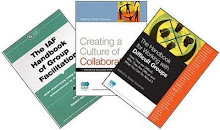In “Reason Seen More as Weapon Than Path to Truth” (New York Times, June 14, 2011), Patricia Cohen provides a brief overview of the theory. Among other observations, the article notes:
Groups are more likely than individuals to come up with better results … because they will be exposed to the best arguments. … [T]he arguing and assessment skills employed by groups make democratic debate the best form of government for evolutionary reasons, regardless of philosophical or moral rationales. … [R]easoned discussion works best in smaller, cooperative environments rather than in … adversarial system[s], in which partisans seek to score political advantage rather than arrive at consensus.The full article is worthwhile. It reviews research on reasoning, inference making, argumentation, group reasoning, the confirmation bias, belief formation and perseverance, and decision making. Overall it supports the case for small-group decision making.
“Why Do Humans Reason? Arguments for an Argumentative Theory,” by Hugo Mercier and Dan Sperber. Behavioral and Brain Sciences, Vol. 34, No. 2, pp. 57-74, April 2011.
The commentaries that accompany the article – some supportive and some counter – are extremely valuable. Those interested in dialogue and deliberation should look in particular at “Deliberative democracy and epistemic humility” by Kevin Chien-Chang Wu (pp. 93-94).










